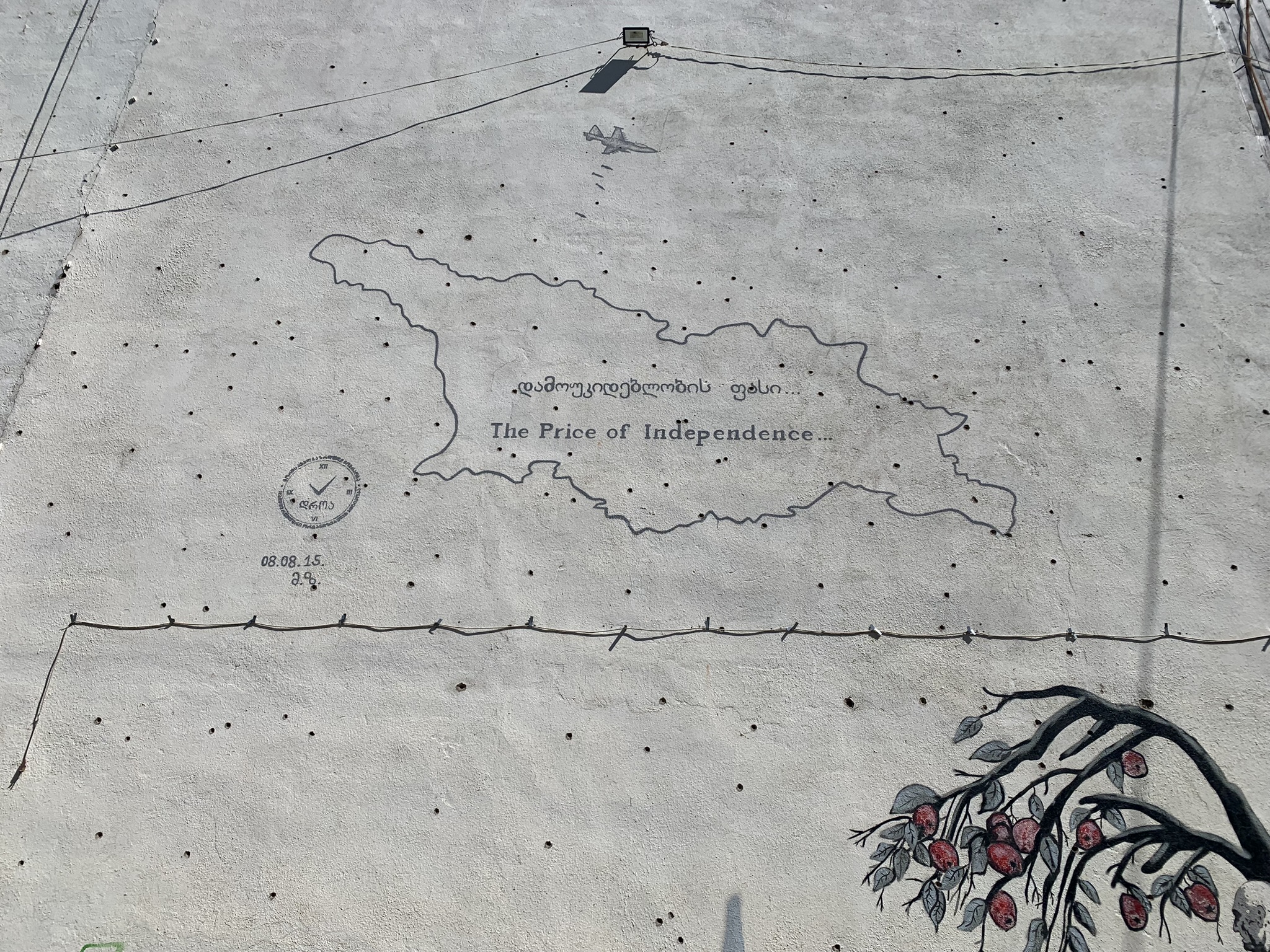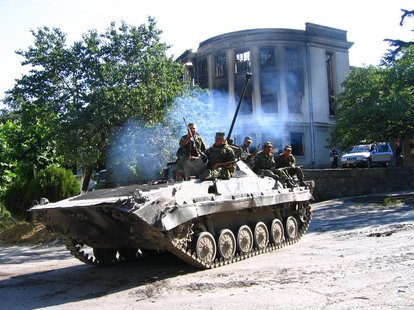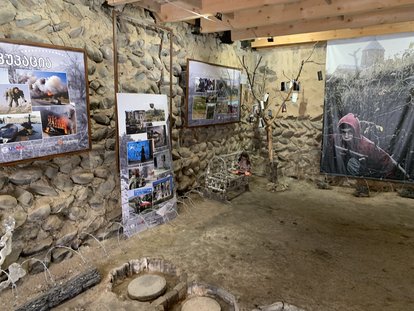Georgia at the crossroads
The Russia-Georgia War in the election campaign

A house wall damaged by Russian cluster munitions in Gori / Eine durch russische Streumunition beschädigte Hauswand in Gori
© Alexander MoisseenkoThe Caucasian War 2008
The Caucasian War of 2008 has become an election issue in Georgia, where a new parliament will be elected on October 26. The ruling party is trying to shift responsibility for the outbreak of the war onto the party of then-President Mikheil Saakashvili and use it as a justification for its planned ban of opposition parties.
South Ossetia and Abkhazia regions have not been at peace for decades. In the early 1990s, militias supported by Russia succeeded in bringing these regions under their rule, although the international community continues to recognize them as Georgian territory.
On the night of August 7-8, 2008, during the term of office of President Mikheil Saakashvili, the frozen conflict reached a new level of escalation, which cost a total of 850 people their lives. After Ossetian militias repeatedly shelled Georgian villages, Georgian troops advanced as far as the Ossetian capital Tskhinvali. But on the very same day, Russia announced a major offensive and bombarded several Georgian cities. Although Russian troops withdrew from some places by the end of August, 20 percent of the country remains occupied by Russia to this day.
In January 2021, the European Court of Human Rights ruled that Russia had violated several articles of the European Convention on Human Rights during the war. Among other things, it prevented the return of 20,000 Georgians who had previously lived in South Ossetia and whose villages had been burned down. The following year, Georgia won all 3,300 cases brought before the European Court of Human Rights in connection with crimes committed by Russia, which also involved instances of killings of Georgian citizens during the post-war occupation. In the same year, the International Criminal Court in The Hague issued arrest warrants for several officials from the Russian-occupied region of South Ossetia. They are accused of torture and ill-treatment of Georgian civilians.
However, Russia portrays itself as the protecting power of the Ossetian population, which merely reacted to Saakashvili's aggression. A narrative that is now also partly supported by the ruling party, "Georgian Dream," which is considered pro-Russian. According to party leader Irakli Gharibashvili, the 2008 war was the worst crime committed by "Saakashvili and his criminal gang," which is why he wants to banish his party from politics forever.

Ein BMP-2-Schützenpanzer der russischen Besatzungstruppen in Südossetien / A BMP-2 infantry fighting vehicle of the Russian occupation forces in South Ossetia
© Yana Amelina (Амелина Я. А.), CC BY-SA 3.0, via Wikimedia CommonsThe Tagliavini Report
An Independent International Fact-Finding Mission commissioned by the Council of the European Union and headed by Swiss diplomat Heidi Tagliavini was tasked with providing clarity on the causes of the clashes and published an investigation report in 2009.
The political council of the ruling party, "Georgian Dream," also refers to the Tagliavini report. It interprets the report entirely in line with Russia's view and declares in a statement that the report is tantamount to a "judgment" for Saakashvili's party. According to the report, the Georgian authorities at the time had provided Russia with a legal basis for its invasion of Georgia with the attack on Tskhinvali.
In fact, the fact-finding mission stated that the war began with the shelling of Tskhinvali by Georgian forces on the night of August 7-8, 2008. This violence is criticized in the report as disproportionate. At the same time, however, the Tagliavini report concedes that this attack was "the culminating point of a long period of increasing tensions, provocations, and incidents”.
Nevertheless, the Georgian Dream party concludes that the fact that Saakashvili's government accepted “a document with such evidence and conclusions” clearly proves that those in power at the time “committed serious treason against their own country and people”.
This is not true, as the Georgian government criticized parts of the investigation report at the time. Shortly after the report was published, the then-Georgian Foreign Ministry announced that the document would help Georgia to underpin its position. At the same time, however, it criticized the comment that Georgia had used disproportionate force: "No democratic government can survive if, when foreign forces enter its territory, it fails to defend its citizens. Georgia has undeniably acted as any other democratic nation would have in this respect".
A spiral of violence
The Tagliavini Report details the long history of the Caucasian war and the fact that the Georgian offensive on Tskhinvali was by no means unprovoked.
According to the report, the Ossetian region was the scene of subversive attacks and increased exchanges of fire between Georgia and South Ossetia in the summer of 2008, with mortar shells and heavy artillery fire also being used. The security situation deteriorated at the beginning of August. An explosive device injured five Georgian police officers on August 1. In the first days of August, there were repeated exchanges of fire, which also resulted in fatalities and injuries.
Parallel to this escalation spiral, an increased presence of Russian troops in the region was documented in the run-up to the war. In April 2008, additional troops reinforced the peacekeeping forces deployed by Russia since the 1990s.
The fact-finding mission also reports on Russian units training and equipping South Ossetian armed forces and an influx of mercenaries from Russian territory to South Ossetia via the Roki tunnel. It also describes the presence of some Russian forces in South Ossetia before the official date of the Russian intervention.

Während der Amtszeit von Präsident Micheil Saakaschwili brach im August 2008 der Kaukasuskrieg aus. Seit 2021 befindet sich der Oppositionspolitiker in Haft / The war broke out in August 2008 during President Mikheil Saakashvili's term in office, the opposition politician has been in prison since 2021.
© picture alliance / NurPhoto | Sergii KharchenkoThe war that began years earlier
In 2012, Vladimir Putin confirmed that the plans for the military operation in Georgia dated back several years. According to this, the General Staff of the Armed Forces prepared a plan for military action against Georgia at the end of 2006, and the Russian President approved it in 2007. As part of the Russian Defense Ministry's plan, Ossetian separatist forces were trained and armed.
The threats that Russia issued against Georgia in the run-up to the fighting also speak more for a pre-planned Russian invasion than Saakashvili spontaneously getting carried away with an artillery bombardment of Tskhinvali. Russia's aim was to prevent Georgia from being tied to the West.
Although Russian Foreign Minister Sergei Lavrov declared in January 2005 that Georgia had the right to join NATO and that they would respect Georgia's decision, the Russian Foreign Ministry abruptly changed its mind in the years that followed.
On April 11, 2008, shortly after the NATO summit in Bucharest, at which the member states expressed their openness regarding Georgia's possible accession, Russian General Yuri Baluyevsky went on to make open threats: "Russia will take steps aimed at securing its interests along its borders". These would be military steps and "steps of a different kind."

Das Kriegsmuseum in Ergneti, ein Dorf in der unmittelbaren Nähe zum von Russland besetzten Zchinwali / The War Museum in Ergneti, a village in the immediate vicinity of Russian-occupied Tskhinvali
© Alexander MoisseenkoTroublesome memories
Ergneti is a Georgian village right on the border with the occupied territories of South Ossetia. The only museum about the Caucasian war is located in the cellar of a private house that was once burnt out. There are photos of the bombed city of Gori, Georgian flags and ammunition, and bomb fragments found in the area.
The operator of the museum also spent the summer of 2008 here and regularly heard the shots fired from Tskhinvali in the days leading up to August 8. Despite the previous Ossetian attacks in the run-up to the war, the ruling Georgian Dream party continues to maintain the view that it was Saakashvili's “adventurous actions” that triggered the conflict. Some politicians are apparently ready to sacrifice the memory of the war's prehistory in favor of good relations with Russia. The inhabitants of Ergneti are not.
Alexander Moisseenko is studying International Relations at the University of Warsaw on a scholarship from the Friedrich Naumann Foundation. He holds a Bachelor's degree in Politics and Society.
